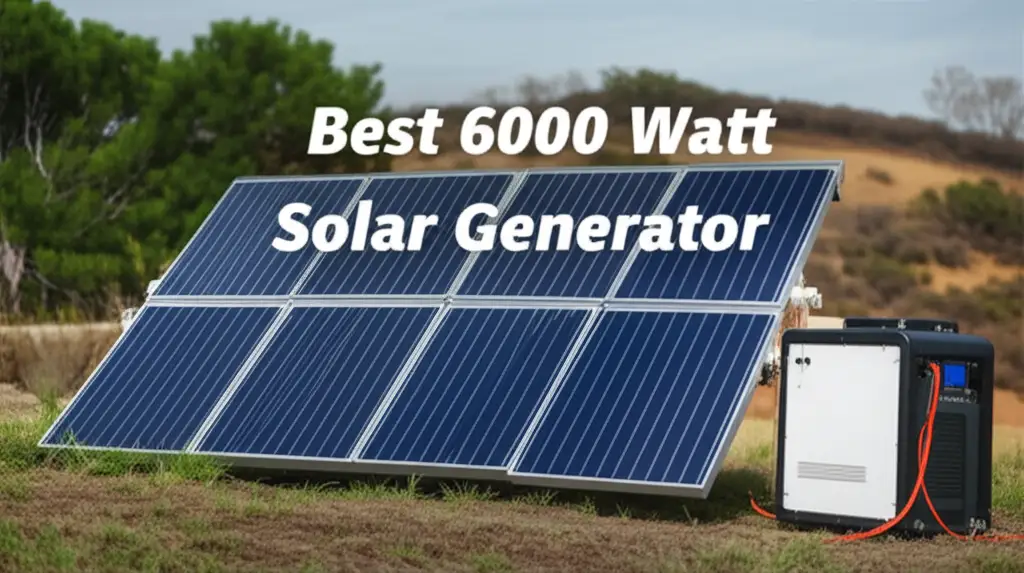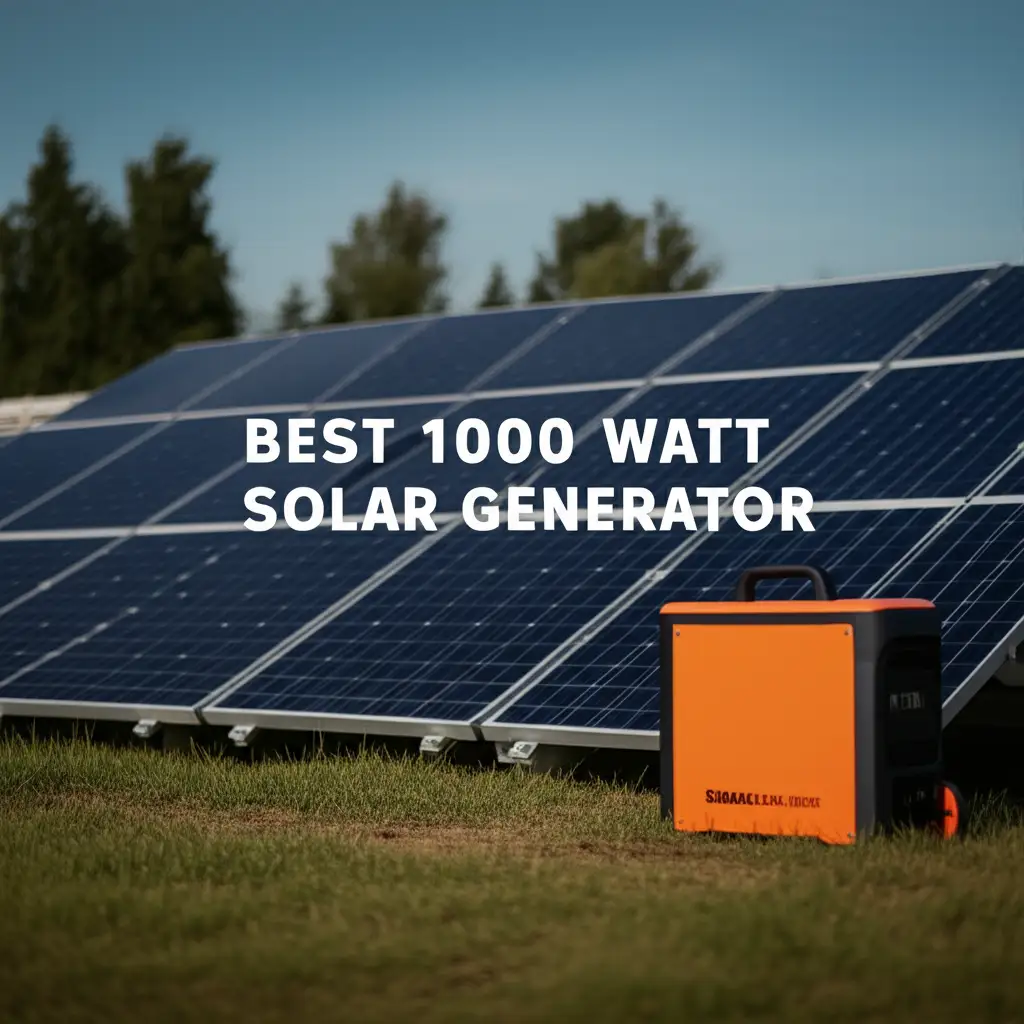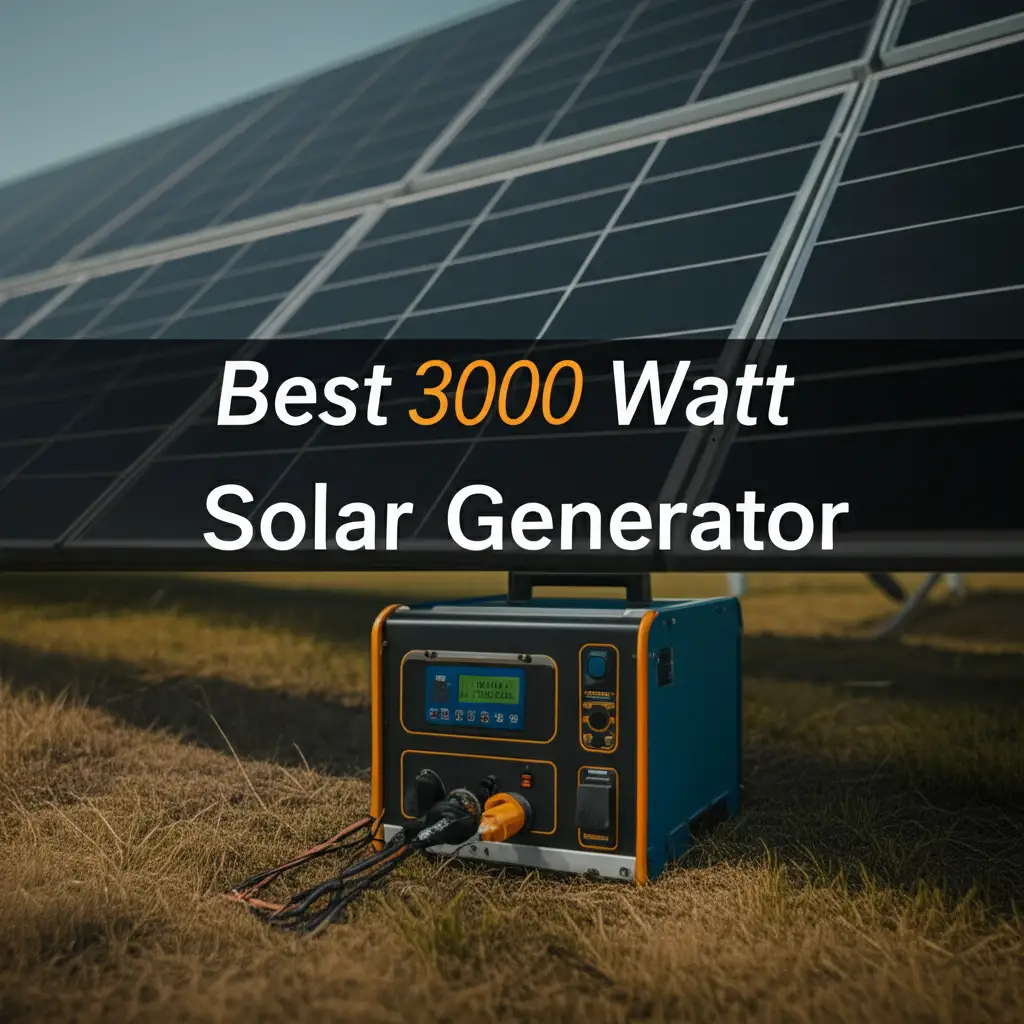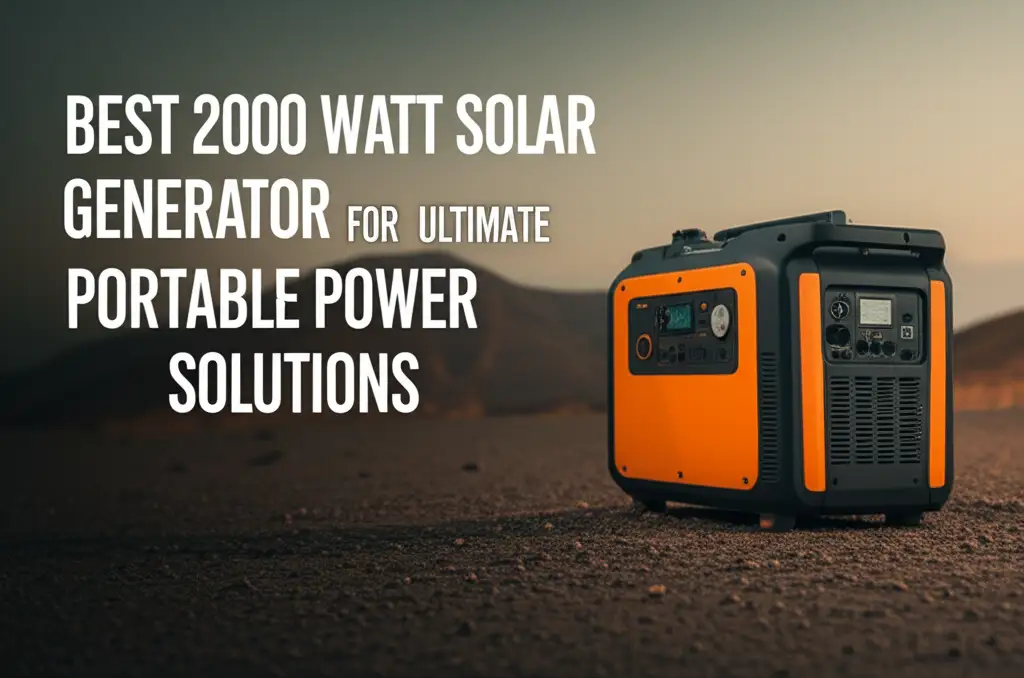· Elira Thomsen · Home Energy · 13 min read
Are Solar Generators Worth The Money
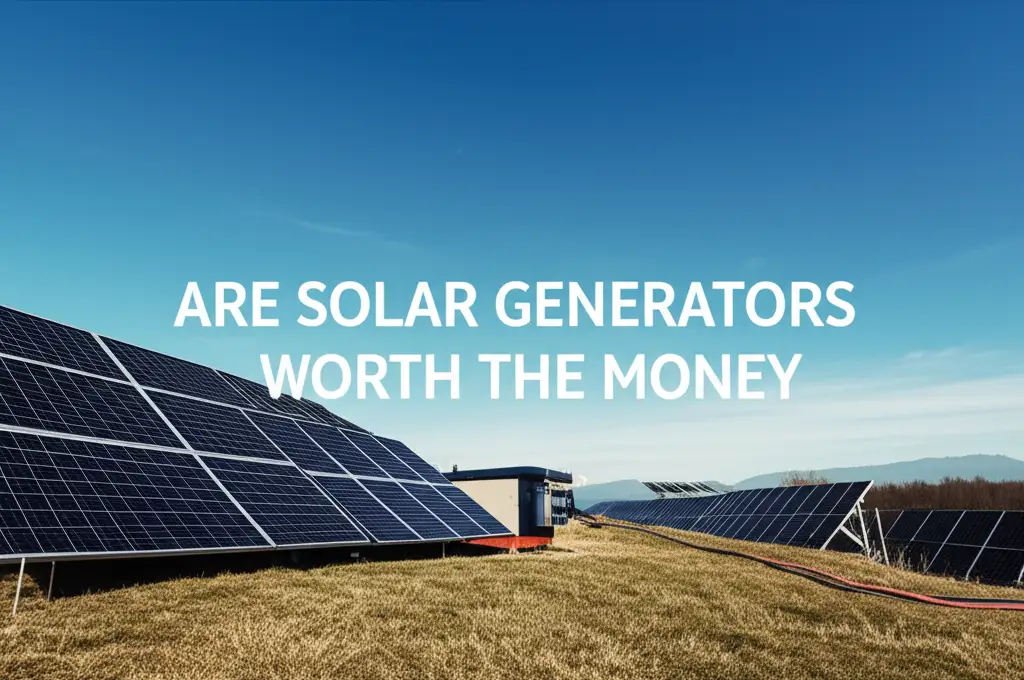
Are Solar Generators Worth the Investment?
Imagine the quiet hum of power, even when the grid goes down. Think about fueling your outdoor adventures without loud, smelly gasoline engines. Many people ask if solar generators are worth the money. They represent a significant shift in how we power our lives, moving us towards cleaner, more sustainable energy. This article explores the value of solar generators. We will discuss their benefits, look at the costs, compare them to traditional options, and help you decide if one fits your needs. Join me as we uncover the true worth of these innovative power solutions.
Takeaway
- Solar generators offer clean, quiet, and reliable power.
- They reduce reliance on fossil fuels and grid power.
- Initial costs are higher than gas generators, but long-term savings exist.
- Choose a generator based on power needs, portability, and battery capacity.
- They provide peace of mind during outages and versatility for outdoor use.
Are solar generators worth the money?
Yes, solar generators are worth the money for many people. They offer clean, quiet, and reliable power. They reduce long-term operating costs by using free sunlight. They provide energy independence and emergency backup. Their environmental benefits also add significant value.
Understanding Solar Generators: What Are They?
A solar generator is a system that uses solar panels to capture sunlight. This sunlight converts into electricity. The electricity then stores in a battery pack. This power is ready for use whenever you need it. Unlike traditional generators, solar generators do not burn fuel. They produce no noise and emit no fumes. This makes them a clean and quiet alternative.
These devices come in various sizes. Some are small and portable. You can carry them for camping or light outdoor use. Others are larger, designed for home backup power. They can keep essential appliances running during outages. Every solar generator has key components. It includes solar panels, a charge controller, a battery, and an inverter. The panels gather energy. The charge controller manages the flow to the battery. The battery stores the energy. The inverter converts stored DC power into usable AC power for your devices. Understanding these parts helps you see how a solar generator works efficiently.
The Benefits of Solar Generators: Why Consider Them?
Choosing a solar generator brings many advantages. One major benefit is their environmental impact. They produce zero emissions during operation. This means they do not release harmful pollutants into the air. This helps reduce your carbon footprint and promotes cleaner air. I find this aspect particularly appealing for a healthier home environment.
Another key advantage is quiet operation. Gas generators are often loud. Solar generators run almost silently. This makes them ideal for residential areas, camping, or any situation where noise is a concern. Imagine powering your devices without disturbing your neighbors or the peace of nature. This quietness also allows for indoor use without ventilation concerns, unlike fuel-powered models.
Cost savings are also a significant factor over time. While the initial investment might be higher, you pay nothing for fuel. Sunlight is free and abundant. This eliminates ongoing fuel costs and maintenance associated with gas engines. You also gain energy independence. You become less reliant on the grid or gas stations. This provides a sense of security, especially during emergencies. For example, a solar generator can keep your refrigerator running, protecting your food during a blackout. This practical benefit alone can save you money and stress.
Initial Costs and Long-Term Savings: Are Solar Generators Truly Affordable?
The upfront cost of a solar generator can seem high. Prices vary greatly based on capacity and features. A small portable unit might cost a few hundred dollars. A large home backup system can cost several thousand dollars. This initial investment often deters people. However, it is important to look beyond this first number.
Consider the long-term financial picture. Traditional gas generators require fuel. Gasoline prices fluctuate and can be high. They also need regular maintenance, like oil changes and spark plug replacements. These ongoing costs add up significantly over the generator’s lifespan. Solar generators, in contrast, have minimal operating costs. They use free sunlight. They require little to no maintenance. There are no fuel purchases, and no engine parts to replace regularly.
Over 5-10 years, the total cost of ownership for a solar generator often becomes lower than a comparable gas generator. You gain energy independence and protection from rising utility costs. Many users also find peace of mind priceless. The ability to have reliable power during an outage, without worrying about fuel, adds immense value. This long-term view helps confirm that solar generators can indeed be a very affordable solution.
Types of Solar Generators and Their Uses
Solar generators come in different types, each suited for specific needs. Understanding these variations helps you choose the best one. I think about what power level I need and where I will use it most. This guides my decision.
Portable Solar Generators
Portable units are compact and lightweight. They are perfect for outdoor activities. Think about camping trips, RV adventures, or tailgating events. They can charge phones, laptops, and small appliances. Many models include convenient carrying handles. Some can even fit in a backpack. Their main purpose is to provide power on the go. You can set up solar panels quickly and enjoy off-grid power anywhere. Imagine relaxing outdoors, powering devices with your solar generator, perhaps while enjoying your clean patio furniture in the sun.
Home Backup Solar Generators
Larger solar generators are for home backup. These units have higher battery capacities and more powerful inverters. They can run essential household appliances. This includes refrigerators, lights, and medical equipment during power outages. They connect to your home’s electrical system, often through a transfer switch. This ensures a seamless transition when the grid fails. They offer peace of mind knowing your home remains powered when disruptions occur.
Off-Grid Solar Power Systems
For true energy independence, some people set up full off-grid solar power systems. These are more complex than simple generators. They involve multiple large solar panels, powerful battery banks, and advanced inverters. They are designed to power an entire home or cabin without any connection to the main electrical grid. This is a significant investment. It offers complete self-sufficiency. These systems are ideal for remote locations or for those committed to living entirely on renewable energy.
Key Factors When Choosing a Solar Generator
Selecting the right solar generator requires careful thought. Many factors influence performance and suitability. Consider these points before making your purchase. I always advise people to think about their specific needs first.
Power Output and Capacity
Power output, measured in watts (W), tells you what appliances a generator can run. Capacity, measured in watt-hours (Wh) or kilowatt-hours (kWh), tells you how long it can run them. Match these numbers to your power needs. List the devices you plan to power. Check their wattage requirements. If you need to run a refrigerator for 10 hours, calculate its watt-hours. Then, choose a generator with a battery capacity that meets or exceeds this. Do not underestimate your needs, but also avoid overpaying for capacity you will not use.
Portability
How much do you plan to move the generator? Smaller units are highly portable. They weigh less and have compact designs. Larger units are heavier and less portable. They might have wheels for easier movement. If you need power for camping, a lightweight model is best. If it is mainly for home backup, weight is less critical. Your intended use dictates the ideal size and weight.
Charging Time and Methods
Consider how long it takes to recharge the generator. This depends on the solar panel size and battery capacity. Faster charging means more readiness. Look for models that support multiple charging methods. Many allow charging via solar panels, wall outlets, or car chargers. Having options is always good. Just as you ensure your solar generator is well-ventilated, keeping your home’s air vents clean improves overall air quality and system efficiency. Efficient charging ensures your power is always ready.
Battery Type and Lifespan
Most modern solar generators use lithium-ion batteries. These are efficient and have a long lifespan. Check the cycle life of the battery. This indicates how many times the battery can be charged and discharged before its capacity significantly degrades. A higher cycle life means a longer-lasting product. Different battery chemistries exist, so understanding their pros and cons is important for long-term satisfaction.
Additional Features
Many solar generators offer extra features. Look for multiple output ports, like AC outlets, USB ports, and DC car ports. A clear display screen helps monitor power levels. Built-in LED lights are useful for emergencies. Some models offer app control for remote monitoring. These features add convenience and value. They can make a big difference in how you use the generator.
Comparing Solar Generators to Traditional Gas Generators
Deciding between a solar generator and a gas generator involves weighing several factors. Each has its strengths and weaknesses. I often help people compare them directly. This helps them make a clear choice.
Noise Level
Gas generators are notoriously loud. Their engines produce significant noise. This can be disruptive in residential areas or quiet natural settings. Solar generators, conversely, operate almost silently. They make no noise as they convert sunlight into electricity. This makes them far more pleasant to use, especially in close quarters.
Emissions and Environment
Traditional gas generators burn fossil fuels. This releases harmful emissions, including carbon monoxide and greenhouse gases. These pollutants are bad for the environment and human health. You cannot run a gas generator indoors due to carbon monoxide risk. Solar generators produce zero emissions during operation. They are a clean energy solution. They contribute to a healthier planet and a safer indoor environment.
Fuel and Maintenance
Gas generators require a constant supply of gasoline. You must store fuel safely, which can be a hazard. They also need regular maintenance. This includes oil changes, spark plug replacements, and filter cleaning. These tasks add to their cost and effort. Solar generators use free sunlight. They have no fuel costs. Their maintenance is minimal, usually just keeping them clean and charged. This reduces ongoing effort and expense.
Portability and Durability
Both types offer portable options. However, solar generators are often lighter and more compact for their power output. They are also generally more rugged as they have fewer moving parts. Gas generators, with their engines and fuel tanks, can be bulkier and require more delicate handling. Solar generators are often built for durability. This makes them reliable in various conditions.
Operation in Various Conditions
Gas generators perform well in cold weather, but starting them can be challenging. They are also less efficient at higher altitudes. Solar generators rely on sunlight. Their efficiency decreases on cloudy days or at night. However, they can store power for later use. This makes them adaptable. You can use stored power when sunlight is not available.
Potential Drawbacks and Limitations of Solar Generators
While solar generators offer many benefits, they also have some limitations. It is important to understand these before investing. I always ensure people know both the good and the challenging parts.
Reliance on Sunlight
The most obvious limitation is their dependence on sunlight. Solar panels need direct sunlight to charge efficiently. On cloudy days, charging is slower. During night, there is no charging. This means you need to plan your power usage or ensure sufficient battery capacity. You cannot generate power from solar panels when the sun is not out. This makes them less suitable for continuous, heavy power demands without a very large battery bank.
Initial Cost
As mentioned, the upfront cost of a solar generator can be a barrier for some. They typically cost more than a comparable gas generator. This initial investment requires careful budgeting. However, remember the long-term savings on fuel and maintenance. Over time, this cost difference can diminish. But the initial hurdle is real.
Limited Power Output for Heavy Appliances
While solar generators are becoming more powerful, some still have limitations. They might not power all heavy-duty appliances simultaneously. High-wattage items like electric water heaters, central air conditioners, or large workshop tools might exceed their capacity. Always check the continuous and surge wattage ratings of a solar generator. Ensure it meets your highest power demand. For example, running multiple large kitchen appliances at once might be too much for some units.
Charging Speed
Recharging a large solar generator can take many hours, even with good sunlight. This is especially true if you are relying solely on solar panels. If you drain the battery completely, it might take a full day or more of sun to recharge it. This can be an issue in emergencies where you need quick turnaround power. Many units offer faster charging from a wall outlet, but that defeats the “solar” purpose if the grid is down.
Size and Weight for Larger Units
While smaller units are very portable, larger home backup solar generators can be heavy and bulky. They are not designed for frequent movement. You might need a dedicated space for them. Their size can also make them challenging to transport without assistance or wheels. This impacts where and how you can deploy them.
FAQ Section
How long do solar generators typically last?
Solar generators can last many years. The battery is the main component affecting lifespan. Most modern solar generators use lithium-ion batteries. These batteries can last for 500 to 3,500 charge cycles. This often translates to 5 to 10 years of regular use. The solar panels can last 20 to 30 years.
Can a solar generator power a whole house?
A typical portable solar generator cannot power a whole house. It is designed for essential appliances. Very large, expensive solar power systems can run a whole house. These are more complex than a “generator.” They usually require professional installation and many solar panels.
Are solar generators noisy?
No, solar generators are almost silent when operating. They have no moving engine parts that burn fuel. This makes them ideal for quiet environments. You will only hear a faint hum from the cooling fan, if any. This is a major advantage over gas generators.
How do solar generators perform in cloudy weather?
Solar generators still charge on cloudy days, but less efficiently. Heavy clouds can reduce charging power by 50-80%. Light clouds might reduce it by 10-30%. The generator relies on stored battery power during low light conditions. Plan for longer charging times or larger solar panel arrays in frequently cloudy areas.
What maintenance do solar generators need?
Solar generators require very little maintenance. You should keep the solar panels clean for efficient charging. Check connections periodically. Store the unit in a dry, cool place when not in use. Regular use helps maintain battery health. There are no oil changes or fuel filters to worry about.
Are solar generators safe to use indoors?
Yes, solar generators are very safe to use indoors. They produce no carbon monoxide or harmful fumes. They operate quietly and do not have flammable fuel. This makes them perfect for powering devices inside your home, apartment, or RV without ventilation concerns.
Conclusion
We have explored the many facets of solar generators. They represent a compelling shift towards cleaner, more sustainable energy solutions. While their initial cost may be higher than traditional gas generators, their long-term benefits are substantial. These include zero fuel costs, minimal maintenance, and quiet, emission-free operation. They offer peace of mind during power outages and provide versatile power for outdoor adventures.
Ultimately, whether solar generators are worth the money depends on your individual needs and priorities. If you value energy independence, environmental responsibility, and reliable backup power without noise or fumes, a solar generator is likely a wise investment. Consider your power requirements, desired portability, and long-term budget. I believe they are an excellent choice for a cleaner, more resilient future. Take the step to evaluate your power needs today. Consider making the switch to a solar generator.
- Solar Generators
- Portable Power Station
- Backup Power
- Renewable Energy
- Emergency Power
- Energy Independence


